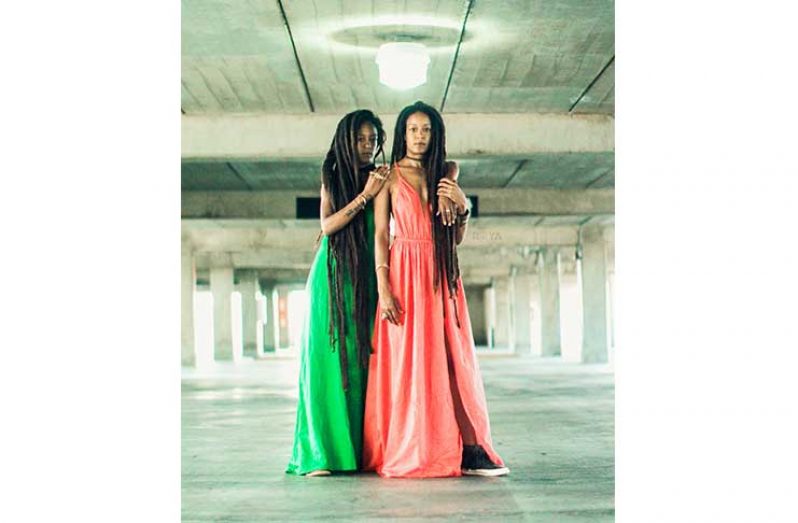Art, fashion and finding balance with T&T’s Wadada Movement
IF you are ever given the opportunity to wear an original piece from Trinidad and Tobago’s Wadada Movement, then you would know what it is to live the Wadada lifestyle. And that is because every piece created by twins, Asha and Ayanna Diaz, the visionaries behind the brand, is infused with love, sincerity and a little bit of rebellion.

The philosophy of their brand is such that they have never genuinely conformed to what’s trending on the market, and instead, make clothing that is accessible to all body types. This can be seen in their line ‘Street Wise,’ which was showcased at the Caribbean Style and Culture Awards in Maryland, earlier this month. Each piece from the collection was one which spoke of being cool, comfortable, but in style all at the same time. Indeed, their style speaks their truth, as young, passionate artists who wish only to imprint in the world the art of living life in a manner that makes you comfortable in your own skin.
“I think people appreciate our style, because it blends with our lifestyle, and it’s easy for everybody to adapt,” Asha told the Pepperpot Magazine. “It’s not just the skimpy clothes where only people who feel like they have the best bodies, could wear. Our pieces are able to accentuate any body type.”
Additionally, both Rastafarian, the sisters agree that their practices also allow them to remain humble in their art and in life in general. “For us, a lot of things are very natural; lots of the products we use are natural products. We spend a lot of time in nature, on the beach, at waterfalls,” Ayanna said. “Basically, our whole lifestyle makes it comfortable for you to feel royal in whatever you do and that is what our collections and our brand try to represent : something that is royal and could give any woman a confidence and a feel that she is beautiful; that she is woman. But everything we do is not just gender-based. We love shopping, but at the same time, we could get down and drive a four-wheel in the bush or in a mud track, or climb to the top of a waterfall. So it’s a good balance that we have of what we think our lifestyle should be: between nature and between modernism.”
About Wadada Movement
The twins have been designing since 2010 and it was then that Wadada Movement (Wadada is the Amharic word for ‘true love’) was established. They have since launched seven collections over the course of their careers. To date, they agree that their most successful line was their most recent, titled ‘Black Sabbath,’ which allowed them to step beyond the norm of their designs and incorporate a more formal look.
“We went a different route, we went a little more formal and had more custom-made pieces rather than ready-to- wear and we had really good feedback and support from that collection. We stepped out of our box for that collection and I think that’s what people enjoyed,” Ayanna said.
But much like in Guyana, the twins admit that the Trinidad and Tobago Arts industry has its challenges in terms of support for artists and sufficient platforms for showcasing their work– but they admit that much of this is slowly changing, as the current government has introduced small business financing programmes that allow artists to access funding. “These things are currently only open to ‘TT’ citizens, but I do think they are building it to where it could be. They have a lot of people from Caribbean islands that come to schools here for fashion or creative education and with that realisation, they are now trying to move in that direction and open it up because ultimately we need everyone focused on the same goal to get to where we need to go,” Asha said.
For them, however, their biggest challenge remains having a platform to sell their clothing. “For us to have an eCommerce platform we have to go to the U.S. It’s available here in Trinidad, but it’s not accessible here for people like us… we don’t have [large amounts of money] to put down,” she said.
Mass production also remains another issue on the twin islands, but the twins themselves have been able to sidestep that hurdle by seeking outside sources to produce their clothing.
Artist’s life
But all in all, these dynamic designers enjoy the artist’s life, and while they engage in other artistic income- earning ventures on the side, it is designing that holds their passion. Moreover, they enjoy being artists and the role that art plays in their lives. “Being an artist puts in perspective what life is about, because I’m not caught up in the everyday eight to four job, so my life is not routine. So you could really appreciate different moments. It’s easier for me to appreciate simple things like a drive to a destination, because I am not doing it every single day, at the same time, at the same hour. I feel that just being creative and being an artist, my life has not been monotonous and I think that’s important for people yes, to have a routine, but not to be monotonous in everything that you do… that is when you just lose the gratitude for things,” Asha said. Ayanna concurred, adding, “Being an artist has made me more humble. Not being part of a routine or being structured in a way that I have to follow a system allows me to create my own system, which is the best thing that anyone can do for themselves,” she said.
Asha and Ayanna were recently awarded the Award of Excellence — Fashion Innovation at the Caribbean Style and Culture Awards and Fashion Showcase, and they are extremely grateful to have been identified and to have their work showcased before members of the Caribbean diaspora.


.jpg)











